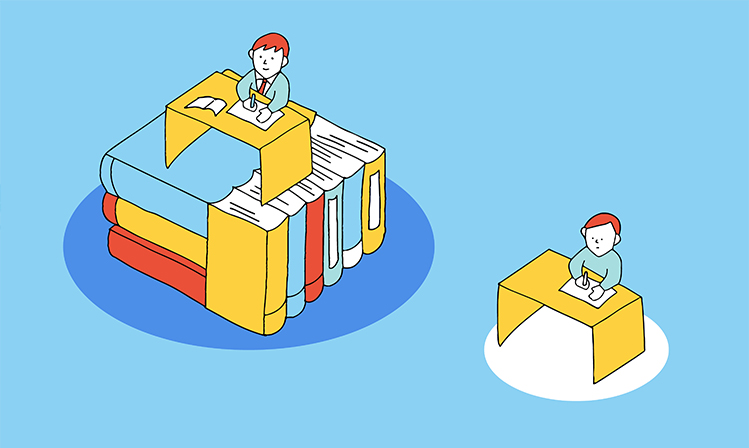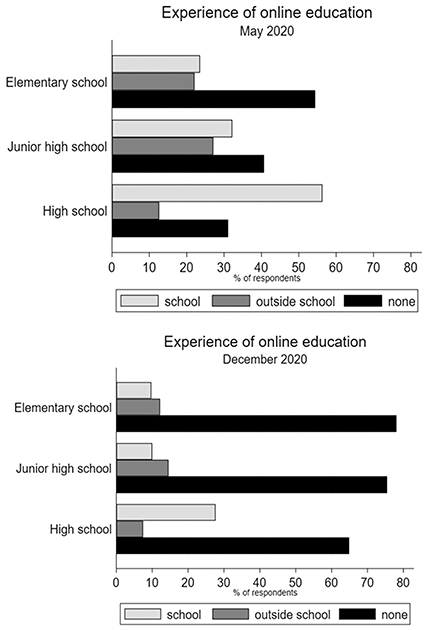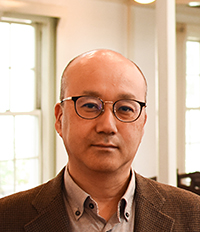School closures during the COVID-19 pandemic highlighted the demand for online school education. Surveys carried out in 2020 reveal differences in access to and parental preferences about online learning possibilities for Japanese children.

©︎ turn_around_around― stock.adobe.com/jp
The recent COVID-19 pandemic, which resulted in worldwide school closures, has clearly demonstrated the usefulness of online education. In Japan, remote education was underdeveloped at the onset of the pandemic - during the first COVID-19-related school closures in the spring of 2020, only 5% of Japanese children had access to interactive online education. There is now intensive research being conducted on online school education, with the topic of how access to online learning correlates with family background being of particular interest. Using datasets provided by the Japanese government, Professor Hideo Akabayashi and graduate school students Shimpei Taguchi and Mirka Zvedelikova from Keio University, have now analysed in detail Japanese children's access to online education during the pandemic.
The data used by Akabayashi and colleagues comes from two surveys on lifestyle attitudes and behavioural changes carried out by the Cabinet Office of the Japanese government. The first was carried between May 25 and June 5, 2020, coming at the end of the country's state of emergency, when schools had opened again. The second survey was held between December 11-17, 2020. Both surveys included questions about the respondent's background, work style, and the education of the youngest school-aged child in the respondent's family. The researchers chose to work with the data of people who filled in both surveys, resulting in a sample of 528 respondents.

Fig. 2 from the paper
Online education experience by school level.
(https://doi.org/10.1016/j.ijedudev.2022.102687) is licensed under CC BY-NC-ND 4.0 DEED
An analysis of these data made it possible to gain insights into the impact of the pandemic on online learning as experienced by children in elementary, junior high, and high schools, both public and private. The researchers made the important distinction between online education at school and outside of school. The latter includes private tutoring and prep schools, offered after regular school hours - parents typically sign their children up to these forms of education to enhance their chances of getting admitted to (often prestigious) higher education institutions.
A first conclusion is that children with at least one highly educated parent, as well as children from high-income households, had better access to online education, particularly outside school. The researchers suggest that this might be because parents of a higher socioeconomic status feel the necessity to look for online educational resources outside school.
Another conclusion is that parents of children who received online education at school perceived such online learning as positive. Also, highly educated parents and parents in high-income households were more welcoming of at-school online education.
One interesting finding concerns households where the mother has regular employment and those where the father has non-regular employment. During the first survey (May-June 2020), respondents representing such households indicated a preference for face-to-face education at school. In the second survey (December 2020), the proportion of respondents who preferred face-to-face education increased; however, this time, when comparing the data between households where the mother has regular employment and/or the father has non-regular employment on the one hand and households where that wasn't the case on the other hand, there were no statistically significant differences based on parental employment status. This suggests that children being at home and schooling remotely, initially conflicted with parents' work duties, but that parents had adjusted to this situation several months later.
The results by Akabayashi and his team revealed differences in access to online education and in parental perception regarding online education during the first year of the COVID-19 pandemic. Over time, this situation may develop into a serious educational inequality, which needs addressing. Notably, the results of this research shows that educational inequality is particularly likely to occur outside of school and that highly specific support tailored to each situation is necessary.
Quoting the researchers: "Overall, our study suggests that ... we need to focus on building an online learning environment accessible to all children, supporting children whose parents feel the difficulties of staying home with them while considering the hidden inequality in the access to online educational outside school."
Published online 14 Novmeber 2023
About the researcher

Hideo Akabayashi ― Professor
Faculty of Economics
Hideo Akabayashi received a Ph.D. in Economics from the
University of Chicago in 1996. He is currently a Professor of
Economics at Keio University. His research interests are in
economics of education and family economics. He is also
a founder/CEO of gaccom.jp, a web directory of Japanese schools.
Before taking these positions, he served as a Japanese government
official and as a consultant for the World Bank.
Links
Reference
- Akabayashi, H. Taguchi, S. Zvedelikova, M. Access to and demand for online school education during the COVID-19 pandemic in Japan. Int. J. Educ. Dev. 96, 102687 (2023). | article